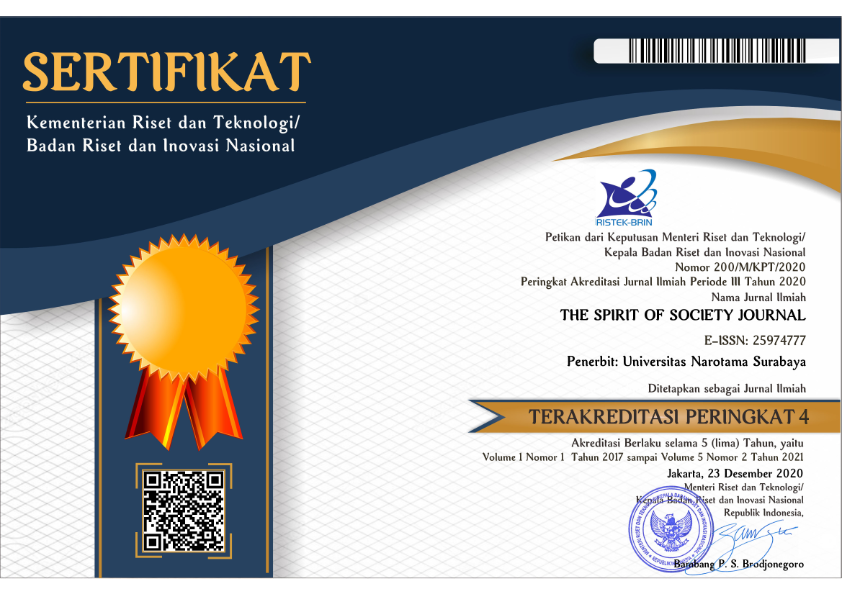Abraham Maslow's Hierarchical Need Fulfillment and Herzberg's Two-Factor Theory for Creating Worker Loyalty
Abstract
This research was conducted in an attempt to identify and analyze the role and influence of two universally applicable theories in the life of an employee when working in a company. The research subjects are employees who work at the bank. The data collection model is carried out primarily using a questionnaire to explore their perceptions in creating and or maintaining a sense of loyalty in their workplace. To prove this, the researchers chose a bank that has been around for a long time, where there are 25 employees. We want to know whether Maslow and Herzberg's theory of motivation remains universally applicable in their work environment. This research is an associative study using the primary data base, this data from interviews and filling out questionnaires from the bank employees. Measurement of data using ordinal data with a Likert scale approach. From the results of filling out the questionnaire, the percentage results obtained that 71.4% of them tend to agree on the existence of their existence and fulfill their needs hierarchically. Through associative analysis, it can be obtained that the physiological results are 49.1% well fulfilled, sense of security is 47.4% fulfilled, social 43.8% is fulfilled, self-esteem 72.5% is fulfilled, and self actualization is 49.1% also fulfilled in the bank, this condition is enough to make their employees loyal in contributing energy, time and thoughts. Overall 93.7% of Maslow's hierarchical needs and Herzberg's maintenance are able to create a sense of employee loyalty to the workplace. The fulfillment of 72.5% hierarchical needs is dominated by the fulfillment of self-esteem, then in terms of maintenance theory, Herzberg is dominated by self-esteem and self-actualization
Downloads
References
Anna-Maija Lämsä; Terttu Savela., (2019), The effects of leadership development on women's career success, International Journal of Human Resources Development and Management, (19)1, pp. 21-36, DOI: 10.1504/IJHRDM.2019.097055
Dessler. Gary, (1992), Manajemen Personalia, Terjemahan, Edisi Ketiga, Erlangga, Jakarta.
Dharma, Agus, (1997). Manajemen Loyalitas, Pedoman Praktis Bagi Para Penyedia Untuk Meningkatkan Loyalitas. CV. Rajawali, Jakarta.
Dr. M.G. Bhaskar, Dr. B. Sahana. (2020). Language As An Integral Part Of Emotional Intelligence Management. International Journal of Advanced Science and Technology, 29(12s), 398 - 402. Retrieved from http: //sersc.org/ journals/index.php/ IJAST/article/view/22046
Dr. Naif Dalish N Alanazi, Dr.Aznan Bin Che Ahmad. (2020). The Effect Of Emotional Intelligence On The Academic Adjustment With Hearing Impairment Students In Saudi Arabia. International Journal of Advanced Science and Technology, 29(12s), 78 - 93. Retrieved from http://sersc.org/journals/index.php/IJAST/article/view/21910
Flippo, Edwin B, (1992), Manajemen Personalia, Jilid II, Terjemahan, Erlangga, Jakarta.
Gay, (1995), Regresi Linier Sebagai Alat Pengukuran dan Evaluasi, Edisi kedua, Terjemahan, Erlangga, Jakarta.
Hadi, Sutrisno, (1997). Metode Research, Jilid 1, Andi Offset, Yogyakarta.
Hamonangan Ismail, D., Asmawi, M., & Widodo, S. E. (2020). The Effect of Organizational Culture, Leadership Style, and Trust to Organizational Commitments of LP3I Polytechnic Jakarta Lectures. IJHCM (International Journal of Human Capital Management), 4(1), 16-25. https://doi.org/10.21009/IJHCM.04.01.02
Handoko, T. Hani, (1992), Manajemen Personalia dan Sumber Daya Manusia, Edisi Kedua, Penerbit: BPFE. Yogyakarta.
Handoko, T. Hani, (1992), Manajemen Personalia dan Sumber Daya Manusia, Edisi Kedua, Yogyakarta.
Srikanth, P.B. & Jomon, M. G., (2020), Developing managerial competencies: integrating work design characteristics and developmental challenge, The International Journal of Human Resource Management, (31)22, pp. 1-26. https://doi.org/10.1080/09585192.2018.1474937
Hyeonjoo, Kim., (2020), Analysis of Diversity on Work Place for Human Resource Management, Global Journal of Human Resource Management, (8)4, pp. 24-31
Kenneth N, Wexley dan Garry A. Yuke, (1990). Perilaku Organisasi Perusahaan dan Psikologi Personalia, Terjemahan, Bina Aksara, Jakarta.
Maslow, H. Abraham, (1994), Motivasi dan Kepribadian, Jilid 1, PT. Pustaka Binaman Pressindo, Jakarta.
Ms. Rekha. R., Dr.V.Senthilkumar,. (2020). A Study On Career Growth And Enhancement Of Employees In Pharmaceutical Companies With Special Reference To Trivandrum City. International Journal of Advanced Science and Technology, 29(12s), 529 - 534. Retrieved from http://sersc.org/journals/index.php/IJAST/article/view/22222
N.Meenakshi & Dr.Vijayakumari Joseph. (2020). Impact of Human Capital Development on Work Quality. International Journal of Advanced Science and Technology, 29(8s), 950 - 958. Retrieved from http://sersc.org/journals/index.php/IJAST/article/view/10862
Nadler dan Lawler, (1994). Penelitian Motivasi dan Loyalitas. Cetakan kedua, Terjemahan, Erlangga, Jakarta.
Porter, Lawler, (1995). Manajemen Personalia, Edisi Kedua, Terjemahan, Erlangga, Jakarta.
Ranupandojo, H. & Suad Husnan, (1993), Manajemen Personalia, Edisi Keempat, BPFE, Yogyakarta.
Reksohadiprojo, Sukanto dan T. Hani Handoko, (1992), "Organisasi Perusahaan,
Siagian, P. Sondang, (1998). Manajemen Sumber Daya Manusia, Bumi Aksara, Jakarta.
Sudrajat, M, SW, (1998), Mengenal Ekonometrika Pemula, Cetakan Pertama, Armico, Bandung.
Sugiyono, (2015), Memahami Penelitian Kualitatif, Alfabeta, Bandung
Copyright (c) 2021 THE SPIRIT OF SOCIETY JOURNAL

This work is licensed under a Creative Commons Attribution-ShareAlike 4.0 International License.












